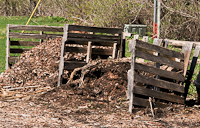|
 |
|
 |
|
 |
|
 Here are some of the more
common problems that may arise with a backyard compost
pile:
|
-
Strong Odors -
If the compost pile is working as it should, it will be doing it
with aerobic (in the presence of oxygen) organisms. If the pile
stinks, it is because anaerobic organisms have taken over. They
produce ammonia and other noxious smelling gasses as they digest
the compost.
Odors are associated with compost piles that are either too wet
or have too much green (nitrogen) in comparison to the brown
(carbon). Mix the pile thoroughly to add more oxygen and allow
it to dry down a bit. Add more carbon in the form of dry leaves
to bring it back into balance.
|
- Pile is Dry - We need to keep
the pile moist but not waterlogged. Add water and mix it into
the pile.
|
- Pile is Damp & Warm in the Center Only -
This happens when the pile is not mixed enough. The material on
the outsides will dry out and the organisms will stop working.
Mix the pile and add some moisture where needed to keep it
moist.
|
|
|
-
Pile Contents Scattered Around -
A compost pile must have a certain volume of material in order
to maintain a healthy population of decomposing organisms. That
is why most bins are in the range of 3 feet tall by 3 feet wide
by 3 feet deep. If the material is widely scattered, it will dry
out quickly and cannot maintain the heat that is generated.
If the contents suddenly become scattered and there is evidence
of digging, this could be caused by the use of animal products
in the pile. Vermin such as rats, racoons, opossums and others
will not be drawn to compost made of vegetation.
|
-
Pile is
Cool - Within a few weeks of starting, the pile should be hot in the center.
Heating generally indicates that the pile is decomposing properly. Failure
to heat may be caused by too little or too much moisture, improper aeration,
packing the material too tightly, or a pile that is too small.
|
|
 |
 Composting
Terminology Composting
Terminology |
|
|



